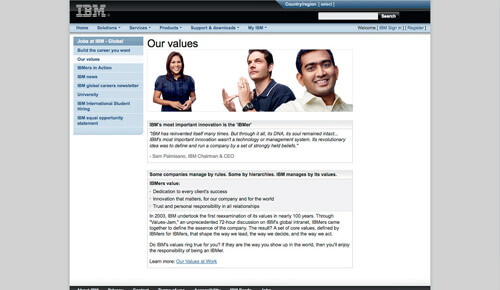Walk the walk
The marketing instinct is to seek differentiation, which explains why marketers rarely take inspiration from their corporate values. What were they again? Oh, yes, integrity, collaboration, trust. Or was it, trust, passion, innovation? Well, something like that. Anyway, back to the business of building the brand and growing market share.
At the level of values – or guiding principles, as big corporations like to call them – brands don’t display much originality. Of the 40 most-valuable global brands, as measured by Millward Brown, almost one third espouse the value of ‘innovation’, which tops the popularity rankings just ahead of ‘integrity’ (see panel).
Sometimes brand teams, if they get a chance to review values, try for distinctiveness, venturing curiosities like ‘paradox’ or ‘today’, only to settle eventually on the same kind of language as everyone else. ‘Achievement, creativity, courage.’ ‘Quality, accountability, respect.’ Or perhaps many wrapped up in an acronym, like Bank of China’s SPIRIT – social responsibility, performance, integrity, respect, innovation, teamwork. Sound familiar?
A hankering for originality at the level of values is understandable, but futile – there are just not that many qualities worth really caring about to go round. Brand personality gives more scope for freedom, and can be used to differentiate brands that are similar in every other way, but at the fundamental level of enduring principles, the breezy, quirky or self-consciously current can simply look trite.
Nevertheless, values can provide a pathway to distinction, not in what they are, but in the zeal with which they are manifested. Any brand with the value of ‘social responsibility’ could take a lesson from Hyundai in how to bring ideals to life. In early 2009, aware of the tension in the US over unemployment, Hyundai guaranteed that any of its customers who lost their job within a year of buying a new car could return it and walk away from their loan obligation with no impact on their credit rating.
Aside from enhancing its reputation for good citizenship, Hyundai’s initiative earned it a 27% sales gain in a year when the industry experienced a 22% drop, and helped it win Advertising Age’s Marketer of the Year Award.
With values, it’s also the breach, not just the observance, that needs to be carefully thought about.
This is one of the few marketing exercises that benefits from a workshop approach. Bring your teams together and ask: ‘What should we stop doing now in order to stay true to our values?’ I have worked on this question with teams across many categories, and the outcome is always a cathartic outpouring. Distribution channels, suppliers, service standards, ingredients, pricing policy, communications all come under intense, impassioned scrutiny.
Managers who make real changes following these sessions, especially if they involve some kind of commercial sacrifice, send a signal to the organisation that it cares about its principles, and this can have a galvanising effect on jaded teams.
At the practical level, it can also prevent the brand making costly errors. Would the corporate stories of BP and Merrill Lynch have been different if they’d been more zealous in heeding their core value of ‘responsibility’?
It isn’t important that values are original. What matters is that they are deeply felt and manifested with imagination. Actively breaching even one of them, ever, it is the corporate equivalent of original sin.
Which values contribute most to commercial success? These were the 10 most frequently cited values by the 40 most-valuable global brands, as ranked by Millward Brown.
1 Innovation. The narrow winner, and a favourite of technology brands, such as Microsoft, Google, IBM and HP.

IBM ticks several ‘values’ boxes, including ‘trust’, ‘innovation’ and ‘responsibility’
2 Integrity. Widely cited in FMCG, is this the secret of success for Gillette, Coca-Cola and Budweiser?
3 = Respect, Responsibility. The latter is prevalent in banking.
5 Ethical. Energy companies are big on this one. Let’s hope they mean it.
6 = Excellence, Openness, Performance. Six mentions each.
9 Trust. IBM, HP, Vodafone and Tesco all sign up to this one.
10 Teamwork. Cited by Verizon Wireless and Bank of America.
Collaboration. The 11th most-mentioned value.
